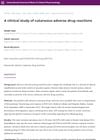Search
forLearn
1 / 1 resultsResearch
5 / 1000+ results
research A Clinical Study of Cutaneous Adverse Drug Reactions
Skin reactions to drugs are most often rashes caused by antibiotics, with nevirapine being the most common culprit; knowing these patterns can improve treatment and outcomes.

research Cutaneous Adverse Drug Reactions to Antibiotics: Extent of the Problem
Antibiotics often cause skin reactions, making them a major health concern.

research Identification of Drug-Specific Public TCR Driving Severe Cutaneous Adverse Reactions
Researchers found a specific immune receptor in patients that causes severe skin reactions to a drug.

research Incidence of Adverse Cutaneous Drug Reactions in a Mexican Sample: An Exploratory Study on Their Association to Tumor Necrosis Factor Alpha TNF2 Allele
Mexican patients had a lower incidence of skin reactions to drugs and no significant link between these reactions and the TNF2 gene variant.

research Spontaneous Cutaneous Adverse Drug Reaction Reports: An Analysis of a 10-Year Dataset in Singapore
In Singapore, most skin reactions to drugs were in females and Chinese, often caused by painkillers, antibiotics, and some other drugs, with serious cases linked to genetics.
Community Join
5 / 17 resultscommunity Why is everyone not directly advised Dutasteride?
Dutasteride is less commonly prescribed for hair loss because it is not FDA-approved for this purpose, unlike finasteride, which is more accessible and preferred due to fewer side effects. Dutasteride may be more effective in reducing DHT but has a longer half-life and potentially more significant side effects.
community Being Safe on Oral Minoxidil: tl;dr on the literature.
Oral minoxidil is effective for hair loss but can cause cardiovascular side effects, such as pericardial effusion, especially in those with genetic predispositions. Starting with low doses and monitoring cardiovascular health are advised to reduce risks.
community New and Interesting HairLoss Studies/Papers/Reviews
Hair loss treatments discussed include Dutasteride with Ketoconazole, tissue engineering strategies, and androgenetic alopecia therapies. Massage doubles follicular retention, improving treatment effectiveness.
community My experimental hair loss journey under medical supervision: finasteride/dutasteride, oral/topical minoxidil+tretinoin (3-month progress and hair transplant insights for those considering it)
A 23-year-old discusses their hair loss treatment using finasteride, dutasteride, oral and topical minoxidil, and topical tretinoin under medical supervision. They stress stabilizing hair loss before a hair transplant and plan to continue the regimen for at least 18 months.
community How do you use rosemary oil and peppermint oil?
Rosemary oil and peppermint oil may promote hair growth and increase cutaneous blood flow, showing promise as treatments for androgenetic alopecia. Minoxidil 2% is also used for treating hair loss.